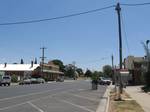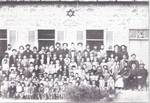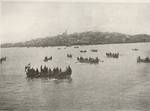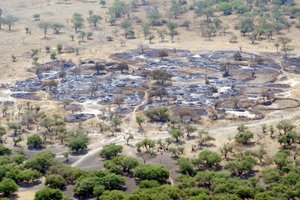- go to the top
- About WN
- Contact
- Feedback
- Privacy Policy
- © 2012 World News Inc., all Rights Reserved
-
Abimelech

Abimelech or Avimelech () was a common name of the Philistine kings.
http://wn.com/Abimelech -
Abraham

Abraham(originally known as Abram) (, , ', ', ) is the founding patriarch of the Israelites, Ishmaelites, Edomites, and the Midianites and kindred peoples, according to the book of Genesis.
http://wn.com/Abraham -
Albrecht Alt
Albrecht Alt (20 September 1883 in Stübach (Franconia) – 24 April 1956 in Leipzig), was a leading German Protestant theologian.
http://wn.com/Albrecht_Alt -
Ammon

Ammon (; ), also referred to as the Ammonites and children of Ammon, was an ancient nation which, according to the Old Testament and other sources, occupied an area east of the Jordan River, Gilead, and the Dead Sea, in present-day Jordan. The chief city of the country was Rabbah or Rabbath Ammon, site of the modern city of Amman, Jordan's capital. Milcom and Molech (perhaps one and the same) are named in the Bible as the gods of Ammon.
http://wn.com/Ammon -
Bethuel
Bethuel (בתואל – Hebrew for “house of God”), in the Hebrew Bible, was an Aramean man, the youngest son of Nahor and Milcah, the nephew of Abraham, and the father of Laban and Rebekah.
http://wn.com/Bethuel -
Govert Flinck

Govert (or Govaert) Teuniszoon Flinck (January 25, 1615February 2, 1660) was a Dutch painter of the Dutch Golden Age.
http://wn.com/Govert_Flinck -
Hebrews
Hebrews (or Hebertes, Eberites, Hebreians; Hebrew: עברים or עבריים, Standard ', ' Tiberian ', ', "traverse or pass over") is a term used in the Hebrew Bible (Tanakh) and is regarded by many scholars as being synonymous with the Israelites.
http://wn.com/Hebrews -
Henry M. Morris
Henry Madison Morris, Ph.D. (October 6, 1918 – February 25, 2006) was an American young earth creationist and Christian apologist. He was one of the founders of the Creation Research Society and the Institute for Creation Research. He is considered by many to be "the father of modern creation science." He wrote numerous creationist and devotional books, and made regular television and radio appearances, predominantly discussing these topics.
http://wn.com/Henry_M_Morris -
Ishmael

Ishmael (; Ismaēl; ; , ) is a figure in the Hebrew Bible, and later referenced in the Qur'an. Jews, Christians and Muslims believe Ishmael is Abraham's eldest son and first born. Ishmael is born of Sarah's handmaiden Hagar (). Although born of Hagar, according to Mesopotamian law, Ishmael was credited as Sarah's son; a legal heir through marriage. () According to the Genesis account, he died at the age of 137 ().
http://wn.com/Ishmael -
Israelite
http://wn.com/Israelite -
Israelites

The Israelites were a people of the Ancient Near East who inhabited the Land of Israel. They are the ancestors of modern-day Jews. The term "Israelites" (or the Twelve Tribes or Children of Israel) means both a people, the descendants of the patriarch Jacob/Israel, and those who worship the god of the people Israel, regardless of ethnic origin. In the biblical history an Israelite can be:
http://wn.com/Israelites -
Jacob

Jacob (; , Standard ', Tiberian '; Septuagint '; '; "heel" or "leg-puller"), also later known as Israel (, Standard ', Tiberian '; Septuagint '; '; "persevere with God"), as described in the Hebrew Bible, was the third patriarch of the Jewish people whom God made a covenant with, and ancestor of the tribes of Israel, named after his descendants.
http://wn.com/Jacob -
Jew
http://wn.com/Jew -
Laban (Bible)

Laban () is the son of Bethuel, brother of Rebekah and the father of Leah and Rachel as described in the Book of Genesis. As such he is brother-in-law to Isaac and both father-in-law and uncle to Jacob. Laban and his family were described as dwelling in Paddan-aram, in Mesopotamia.
http://wn.com/Laban_(Bible) -
Martin Noth
Martin Noth (August 3, 1902 – May 30, 1968) was a German scholar of the Hebrew Bible who specialized in the pre-Exilic history of the Hebrews. With Gerhard von Rad he pioneered the traditional-historical approach to biblical studies, emphasising the role of oral traditions in the formation of the biblical texts.
http://wn.com/Martin_Noth -
Michael (archangel)

Michael ( (pronounced ), ''Micha'el or Mîkhā'ēl; , Mikhaḗl; or Míchaël; , Mīkhā'īl'') is an archangel in Jewish, Christian, and Islamic tradition. He is viewed as the field commander of the Army of God. He is mentioned by name in the Book of Daniel, the Book of Jude, and the Book of Revelation, in which he leads God's armies against Satan's forces during his uprising. In the book of Daniel, Michael appears as "one of the chief princes" who in Daniel's vision comes to Gabriel's aid in his contest with the angel of Persia (Dobiel). Michael is also described there as the advocate of the Children of Israel and as a "great prince who stands up for the children of your [Daniel's] people".
http://wn.com/Michael_(archangel) -
patriarchs (Bible)
http://wn.com/patriarchs_(Bible) -
Philistines

The Philistines (, ''p'lishtim'') (see "other uses" below) were a people who occupied the southern coast of Canaan, their territory being named Philistia in later contexts. It is theorized that the latter Philistines originated among the "sea peoples". Modern archaeology has also suggested early cultural links with the Mycenean world in Greece. Though the Philistines adopted local Canaanite culture and language before leaving any written texts (and later adopted the Aramaic language), an Indo-European origin has been suggested for a handful of known Philistine words that survived as loanwords in Hebrew.
http://wn.com/Philistines -
Sarah

Sarah or Sara (; ; ; Arabic: ) was the wife of Abraham and the mother of Isaac as described in the Hebrew Bible and the Quran. Her name was originally Sarai. According to Genesis 17:15 God changed her name to Sarah as part of a covenant with Yahweh after Hagar bore Abraham his son Ishmael.
http://wn.com/Sarah
-
Beersheba

Beersheba (, ''Be'er Sheva; ; ; , ''; ) is the largest city in the Negev desert of southern Israel. Often referred to as the "Capital of the Negev", it is the seventh-largest city in Israel with a population of 187,200.
http://wn.com/Beersheba -
Egypt

Egypt (; , Miṣr, ; Egyptian Arabic: مصر, Maṣr, ; Coptic: , ; Greek: Αίγυπτος, Aiguptos; Egyptian:
http://wn.com/Egypt -
Hebron

Hebron (Arabic: ; Hebrew: , Standard Hebrew: , Tiberian: ), is located in the southern West Bank, 30 km (19 mi) south of Jerusalem. Nestling in the Judean Mountains, it lies 930 meters (3,050 ft) above sea level. It is the largest city in the West Bank and home to around 165,000 Palestinians, and over 500 Israeli settlers concentrated in and around the old quarter. The city is most notable for containing the traditional burial site of the biblical Patriarchs and Matriarchs and is therefore considered the second-holiest city in Judaism. The city is also venerated by Muslims as the burial place of the prophet Abraham. and was traditonally viewed as one of the "four holy cities of Islam."
http://wn.com/Hebron -
Negev

The Negev (also Negeb; , Tiberian vocalization: , ) is a desert and semidesert region of southern Israel. The Arabs, including the native Bedouin population of the region refer to the desert as al-Naqab (). The origin of the word Negev is from the Hebrew root denoting 'dry'. In the Bible the word Negev is also used for the direction 'south'.
http://wn.com/Negev -
nomad
http://wn.com/nomad -
Sinai Peninsula

The Sinai Peninsula or Sinai; ''sīnā'a''; Hebrew סיני) is a triangular peninsula in Egypt which is about . It lies between the Mediterranean Sea to the north, and the Red Sea to the south, and is the only part of Egyptian territory located in Asia as opposed to Africa. In addition to its formal name, Egyptians also refer to it affectionately as the "Land of Fayrouz", based on the Ancient Egyptian "Dumafkat", which has the same meaning. The peninsula is divided into two Egyptian governorates, and has a population of approximately 1.3 million people.
http://wn.com/Sinai_Peninsula -
Sodom and Gomorrah

Sodom (, Greek Σόδομα) and Gomorrah (, Greek Γόμορρα) were, according to the Bible, two cities which were destroyed by God.
http://wn.com/Sodom_and_Gomorrah
- Abraham
- Adiaphora
- Aggadah
- Al-Anbiya
- Albrecht Alt
- Ammon
- angel
- Anglicisation
- Arabian Peninsula
- Arabic
- archangel
- asceticism
- Atonement in Judaism
- ayah
- Baker Book House
- Beersheba
- Bethuel
- Bible
- Book of Amos
- Book of Genesis
- Canaan
- Canaanite religion
- Catacombs of Rome
- Christian
- Christian Church
- Christian cross
- Christianity
- Early Christianity
- Edom
- Egypt
- El (deity)
- Eliezer
- Elohim
- Elohist
- Epistle of James
- Esau
- Form criticism
- fresco
- Gerar
- God
- God in Islam
- God in Judaism
- Govert Flinck
- Greek language
- halakha
- heaven
- Hebrew Bible
- Hebrews
- Hebron
- hell
- Henry M. Morris
- History
- illustration
- Ishmael
- Islam
- ISO 259-3
- Israelite
- Israelites
- Jacob
- Jahwist
- Jew
- Jewish Encyclopedia
- Judaism
- Kingdom of Judah
- Laban (Bible)
- Land of Israel
- legend
- Martin Noth
- martyr
- Mesopotamia
- Michael (archangel)
- monotheism
- Moriah
- Muslim
- names of God
- Negev
- New Testament
- nomad
- Old Testament
- Palestine
- Pastoralism
- patriarch
- patriarchs (Bible)
- Philistines
- priest
- Prophets of Islam
- pseudonym
- Qur'an
- rabbi
- Rabbinic literature
- Rebecca
- Sarah
- Satan
- servant of God
- Sinai Peninsula
- Sodom and Gomorrah
- Strong's Concordance
- sura
- Testament of Abraham
- Torah
- Transjordan (Bible)
- tribe
- Ugaritic language
- Yahweh

- Order: Reorder
- Duration: 6:04
- Published: 23 Jul 2009
- Uploaded: 01 Jan 2012
- Author: TheMadonnaCN


- Order: Reorder
- Duration: 3:45
- Published: 26 Oct 2007
- Uploaded: 01 Jan 2012
- Author: oscarbm2000


- Order: Reorder
- Duration: 2:26
- Published: 01 Sep 2011
- Uploaded: 01 Jan 2012
- Author: IGNentertainment


- Order: Reorder
- Duration: 5:30
- Published: 30 Dec 2006
- Uploaded: 31 Dec 2011
- Author: lastangelman

- Order: Reorder
- Duration: 4:40
- Published: 29 Aug 2010
- Uploaded: 01 Jan 2012
- Author: DukeFanGermany
![Qlimax 2009 Dj Isaac [ Official HD Dvd Rip ] Qlimax 2009 Dj Isaac [ Official HD Dvd Rip ]](http://web.archive.org./web/20120112011110im_/http://i.ytimg.com/vi/nlkmYZa6OQs/0.jpg)
- Order: Reorder
- Duration: 8:57
- Published: 25 Feb 2010
- Uploaded: 01 Jan 2012
- Author: Samirrr1988

- Order: Reorder
- Duration: 1:27
- Published: 31 Oct 2011
- Uploaded: 01 Jan 2012
- Author: WolfireGames

- Order: Reorder
- Duration: 8:24
- Published: 04 Feb 2010
- Uploaded: 27 Dec 2011
- Author: sixtysymbols

- Order: Reorder
- Duration: 2:34
- Published: 03 Feb 2009
- Uploaded: 19 Dec 2011
- Author: thewayofthemaster

![Isaac Hayes: Walk On By [Live at Music Scene, 1969] Isaac Hayes: Walk On By [Live at Music Scene, 1969]](http://web.archive.org./web/20120112011110im_/http://i.ytimg.com/vi/U5tqAbrZeX0/0.jpg)
- Order: Reorder
- Duration: 3:24
- Published: 20 Apr 2008
- Uploaded: 01 Jan 2012
- Author: oifnolykous

![Let's Play - The Binding of Isaac - Episode 1 [Genesis] Let's Play - The Binding of Isaac - Episode 1 [Genesis]](http://web.archive.org./web/20120112011110im_/http://i.ytimg.com/vi/c5PLC6nmOO4/0.jpg)
- Order: Reorder
- Duration: 11:45
- Published: 29 Sep 2011
- Uploaded: 02 Jan 2012
- Author: Northernlion


- Order: Reorder
- Duration: 4:00
- Published: 25 May 2008
- Uploaded: 31 Dec 2011
- Author: TrueSpikey

- Order: Reorder
- Duration: 1:29
- Published: 28 Sep 2011
- Uploaded: 02 Jan 2012
- Author: iamjamesid

- Order: Reorder
- Duration: 10:00
- Published: 20 Jan 2009
- Uploaded: 01 Jan 2012
- Author: cybersputnik

- Order: Reorder
- Duration: 10:00
- Published: 20 Jan 2009
- Uploaded: 01 Jan 2012
- Author: cybersputnik


- Order: Reorder
- Duration: 9:29
- Published: 05 Jul 2008
- Uploaded: 31 Dec 2011
- Author: onlyrealhiphop12
size: 6.2Kb
size: 3.1Kb
- Abimelech
- Abraham
- Adiaphora
- Aggadah
- Al-Anbiya
- Albrecht Alt
- Ammon
- angel
- Anglicisation
- Arabian Peninsula
- Arabic
- archangel
- asceticism
- Atonement in Judaism
- ayah
- Baker Book House
- Beersheba
- Bethuel
- Bible
- Book of Amos
- Book of Genesis
- Canaan
- Canaanite religion
- Catacombs of Rome
- Christian
- Christian Church
- Christian cross
- Christianity
- Early Christianity
- Edom
- Egypt
- El (deity)
- Eliezer
- Elohim
- Elohist
- Epistle of James
- Esau
- Form criticism
- fresco
- Gerar
- God
- God in Islam
- God in Judaism
- Govert Flinck
- Greek language
- halakha
- heaven
- Hebrew Bible
- Hebrews
- Hebron
- hell
- Henry M. Morris
- History
- illustration
- Ishmael
- Islam
- ISO 259-3
- Israelite
- Israelites
- Jacob
size: 1.6Kb
size: 1.8Kb
size: 1.5Kb
size: 1.6Kb
size: 1.0Kb
size: 1.9Kb
size: 5.5Kb
size: 5.0Kb
size: 6.3Kb
| Coordinates | 34°03′″N118°15′″N |
|---|---|
| Name | Isaac |
| Venerated in | JudaismChristianityIslam |
| Birth place | Canaan |
| Death place | Canaan |
| Titles | Prophet, Seer, Second Hebrew Patriarch, Father of Israel, Holy Forefather |
| Major shrine | Cave of the Patriarchs, Hebron |
| Influences | His father Abraham |
| Influenced | Jacob, the Twelve Tribes of Israel as well as many Jews, Christians and Muslims |
| Prayer attrib | }} |
Isaac (; , ISO 259-3 Yiçḥaq, "he will laugh"; , ; , ; ; or ) as described in the Hebrew Bible, was the only son Abraham had with his wife Sarah, and was the father of Jacob and Esau. Isaac was one of the three patriarchs of the Israelites. According to the Book of Genesis, Abraham was 100 years old when Isaac was born, and Sarah was beyond childbearing years.
Isaac was the only Biblical patriarch whose name was not changed, and the only one who did not leave Canaan. Compared to those of Abraham and Jacob, Isaac's story relates fewer incidents of his life. He died when he was 180 years old, making him the longest-lived patriarch.
Etymology
The anglicized name Isaac is a transliteration of the Hebrew term which literally means "He laughs/will laugh." Ugaritic texts dating from the 13th century BCE refer to the benevolent smile of the Canaanite deity El. Genesis, however, ascribes the laughter to Isaac's mother Sarah rather than El. According to the Biblical narrative, Sarah laughed privately when Elohim imparted to Abraham the news of their son's eventual birth. Sarah laughed because she was past the age of childbearing; both she and Abraham were advanced in age.
Isaac in Genesis
The account of Isaac from the Book of GenesisIsaac is mentioned by name 80 times in Genesis.
Birth of Isaac
It was prophesied to the patriarch Abraham that he would have a son and that his name should be called Isaac. When Abraham became one hundred years old, this son was born to him by his first wife Sarah. Though this was Abraham's second son it was Sarah’s first and only child.On the eighth day from his birth, Isaac was circumcised, as was necessary for all males of Abraham's household, in order to be in compliance with Yahweh's covenant.
After Isaac had been weaned, Sarah saw Ishmael mocking, and urged her husband to banish Hagar and Ishmael so that Isaac would be Abraham's only heir. Abraham was hesitant, but at God's order he listened to his wife's request.
Binding of Isaac
At some point in Isaac's youth, his father Abraham brought him to mount Moriah. At Yahweh's command to Abraham, he was to build a sacrificial altar and sacrifice his son Isaac upon it. After binding his son to the altar and drawing his knife to kill him, in the very last moment an angel of Yahweh prevented Abraham from proceeding. Rather, he was directed to sacrifice a nearby ram instead. This event served as a test of Abraham's faith to Yahweh, not as an actual human sacrifice.
Family life
When Isaac was 40, Abraham sent Eliezer, his steward, into Mesopotamia to find a wife for Isaac, from his nephew Bethuel's family. Eliezer chose Rebekah for Isaac. After many years of marriage to Isaac, Rebekah had still not given birth to a child and was believed to be barren. Isaac prayed for her and she conceived. Rebekah gave birth to twin boys, Esau and Jacob. Isaac was 60 years old when his two sons were born. Isaac favored Esau, and Rebekah favored Jacob.
Occupation
Around the age of 75, Isaac moved to Beer-lahai-roi after his father died. When the land experienced famine, he removed to the Philistine land of Gerar where his father once lived. This land was still under the control of King Abimelech as it was in the days of Abraham. Like his father, Isaac also deceived Abimelech about his wife and also got into the well business. He had gone back to all of the wells that his father dug and saw that they were all stopped up with earth. The Philistines did this after Abraham died. So, Isaac unearthed them and began to dig for more wells all the way to Beersheba, where he made a pact with Abimelech, just like in the day of his father.
Birthright
Isaac grew old and became blind. He called his son Esau and directed him to procure some venison for him, in order to receive Isaac's blessing. While Esau was hunting, Jacob deceptively, after listening to his mother's advice misrepresented himself as Esau to his blind father and obtained his father's blessing, making Jacob Isaac's primary heir, and leaving Esau in an inferior position. Isaac sent Jacob into Mesopotamia to take a wife of his own family so, he can start a family of his own. After 20 years working for Laban, Jacob returned home, and reconciled with his twin brother Esau, then he and Esau buried Isaac when Isaac died at the age of 180.
Other references
Isaac in the New Testament
In the New Testament, there are references to Isaac having been "offered up" by his father, and to his blessing his sons. Paul contrasted Isaac, symbolizing Christian liberty, with the rejected older son Ishmael, symbolizing slavery; Hagar is associated with the Sinai covenant, while Sarah is associated with the covenant of grace, into which her son Isaac enters.The Epistle of James chapter 2, verses 21-24 states that the sacrifice of Isaac shows that justification (in the Johannine sense) requires both faith and works.In the early Christian church, Abraham's willingness to follow God's command to sacrifice Isaac was used as an example of faith and of obedience. The Epistle to the Hebrews chapter 11, verse 19 views the release of Isaac from sacrifice as analogous to the resurrection of Jesus, the idea of the sacrifice of Isaac being a prefigure of the sacrifice of Jesus on the cross.
Isaac in the Qur'an
Like many of the biblical Hebrew patriarchs and prophets, the Qur'an mentions Isaac as a righteous man of God. Isaac (and Jacob) are mentioned as being bestowed upon Abraham as gifts of God, who then worshipped God only and were righteous leaders in the way of God: }}
Testament of Isaac
The Testament of Isaac is a pseudonymous text which was most likely composed in Greek in Egypt after 100 CE. It is also dependent on the Testament of Abraham. In this testament, God sends the archangel Michael to Isaac in order to inform him of his impending death. Isaac accepts God's decree but Jacob resists. Isaac in his bed-chamber tells Jacob of the inevitability of death. Isaac has a tour of heaven and hell shortly before his death in which God's compassion to repentant sinners is emphasized. In this testament, Isaac also talks with the crowds on the subjects of priesthood, asceticism, and the moral life.
World views
The early Christian church viewed Abraham's willingness to follow God's command to sacrifice Isaac as an example of faith and obedience. For Christians, Abraham's willingness to sacrifice his son is a "type and shadow" of God's willingness to sacrifice his only son, Jesus.Islam considers Isaac as a prophet of Islam, and describes him as the father of the Israelites and a righteous servant of God.
Some academic scholars have described Isaac as "a legendary figure", while others view him as "a figure representing tribal history, though as a historical individual" or as "a seminomadic leader".
Documentary hypothesis
The name Isaac occurs 32 times in the Hebrew Bible. Variations of the formula "Abraham, Isaac, and Jacob" occur 23 times in the Hebrew Bible. According to the documentary hypothesis, use of names of God indicates authorship, and form critics variously assign passages like Genesis chapter 26, verses 6-11 to the Yahwist source, and Genesis chapter 20 verses 1-7, chapter 21, verse 1 to chapter 22, verse 14 and chapter 22, verse 19 to the Elohist source; this source-critical approach has admitted problems, in that the name "Yahweh" appears in Elohist material. According to the compilation hypothesis, the formulaic use of the word toledoth (generations) indicates that Genesis chapter 11, verse 27 to chapter 25, verse 19 is Isaac's record through Abraham's death (with Ishmael's record appended), and Genesis chapter 25, verse 19 to chapter 37, verse 2 is Jacob's record through Isaac's death (with Esau's records appended).
Jewish views
In rabbinical tradition the age of Isaac at the time of binding is taken to be 37 which contrasts with common portrayals of Isaac as a child. The rabbis also thought that the reason for the death of Sarah was the news of the intended sacrifice of Isaac. The sacrifice of Isaac is cited in appeals for the mercy of God in later Jewish traditions. The post-Biblical Jewish interpretations often elaborate the role of Isaac beyond the Biblical description and largely focus on Abraham's intended sacrifice of Isaac, called the aqedah ("binding"). According to a version of these interpretations, Isaac died in the sacrifice and was revived. According to many accounts of Aggadah, unlike the Bible, it is Satan who is testing Isaac and not God. Isaac's willingness to follow God's command at the cost of his death has been a model for many Jews who preferred martyrdom to violation of the Jewish law.According to the Jewish tradition Isaac instituted the afternoon prayer. This tradition is based on Genesis chapter 24, verse 63 ("Isaac went out to meditate in the field at the eventide").
Isaac was the only patriarch who stayed in Canaan during his whole life and though once he tried to leave, God told him not to do so. Rabbinic tradition gave the explanation that Isaac was almost sacrificed and anything dedicated as a sacrifice may not leave the Land of Israel. Isaac was the oldest of the Biblical patriarchs at the time of his death, and the only patriarch whose name was not changed.
Rabbinic literature also linked Isaac's blindness in old age, as stated in the Bible, to the sacrificial binding: Isaac's eyes went blind because the tears of angels present at the time of his sacrifice fell on Isaac's eyes. The Qur'an states that Abraham received "good tidings of Isaac, a prophet, of the righteous", and that God blessed them both (XXXVII: 12). In a fuller description, when angels came to Abraham to tell him of the future punishment to be imposed on Sodom and Gomorrah, his wife, Sarah, "laughed, and We gave her good tidings of Isaac, and after Isaac of (a grandson) Jacob" (XI: 71-74); and it is further explained that this event will take place despite Abraham and Sarah's old age. Several verses speak of Isaac as a "gift" to Abraham (VI: 84; XIX: 49-50), and XXIX: 26-27 adds that God made "prophethood and the Book to be among his offspring", which has been interpreted to refer to Abraham's two prophetic sons, his prophetic grandson Jacob, and his prophetic great-grandson Joseph. In the Qur'an, it later narrates that Abraham also praised God for giving him Ishmael and Isaac in his old age (XIV: 39-41).
Elsewhere in the Qur'an, Isaac is mentioned in lists: Joseph follows the religion of his forefathers Abraham, Isaac and Jacob (XII: 38) and speaks of God's favor to them (XII: 6); Jacob's sons all testify their faith and promise to worship the God that their forefathers, "Abraham, Ishmael and Isaac", worshiped (II: 127); and the Qur'an commands Muslims to believe in the revelations that were given to "Abraham, Ishmael, Isaac, Jacob and the Patriarchs" (II: 136; III: 84). In the Qur'an's narrative of Abraham's near-sacrifice of his son (XXXVII: 102), the name of the son is not mentioned and debate has continued over the son's identity, though many feel that the identity is the least important element in a story which is given to show the courage that one develops through faith.
Western scholarly views
Some scholars have described Isaac as "a legendary figure" while others view him "as a figure representing tribal history, though as a historical individual" or "as a seminomadic leader."The stories of Isaac, like other patriarchal stories of Genesis, are generally believed in liberal Western scholarship to have "their origin in folk memories and oral traditions of the early Hebrew pastoralist experience." Conservative Western scholarship believes the stories of Isaac, and other patriarchal stories in Genesis, to be factual. The Cambridge Companion to the Bible makes the following comment on the Biblical stories of the patriarchs:
According to Martin Noth, a scholar of the Hebrew Bible, the narratives of Isaac date back to an older cultural stage than that of the West-Jordanian Jacob. At that era, the Israelite tribes were not yet sedentary. In the course of looking for grazing areas, they had come in contact in southern Palestine with the inhabitants of the settled countryside. The Biblical historian, A. Jopsen, believes in the connection between the Isaac traditions and the north and in support of this theory adduces Amos 7:9 ("the high places of Isaac").
Albrecht Alt and Martin Noth hold that, "The figure of Isaac was enhanced when the theme of promise, previously bound to the cults of the 'God the Fathers' was incorporated into the Israelite creed during the southern-Palestinian stage of the growth of the Pentateuch tradition." According to Martin Noth, at the Southern Palestinian stage of the growth of the Pentateuch tradition, Isaac became established as one of the Biblical patriarchs, but his traditions were receded in the favor of Abraham.
In art
The earliest Christian portrayal of Isaac is found in the Roman catacomb frescoes. Excluding the fragments, Alison Moore Smith classifies these artistic works in three categories:
See also
Notes
References
External links
Category:Biblical patriarchs Category:Book of Genesis Category:Burials in Hebron Category:Descendants of Eber Category:Edom Category:Old Testament saints Category:People celebrated in the Lutheran liturgical calendar Category:Prophets of Islam Category:Torah people
ace:Ishaq ar:إسحاق az:İshaq be:Ісак, патрыярх bo:ཨི་སཱག bs:Isak (prorok) bg:Исаак ca:Isaac cs:Izák cy:Isaac de:Isaak (Genesis) et:Iisak el:Ισαάκ es:Isaac eo:Isaak eu:Isaak ee:Isak fa:اسحاق fr:Isaac gl:Isaac ko:이사악 hr:Izak id:Ishak it:Isacco he:יצחק ka:ისააკი sw:Isaka lbe:ИсхӀакъ идавс la:Isaac lt:Izaokas hu:Izsák (Biblia) ml:ഇസ്ഹാഖ് നബി nl:Izaäk (aartsvader) ja:イサク no:Isak nn:Patriarken Isak ps:اسحاق pl:Izaak pt:Isaac ro:Isac (personaj biblic) rm:Isaac ru:Исаак simple:Isaac so:Nabi Isxaaq C.S. sr:Исак fi:Iisak sv:Isak (Bibeln) tl:Isaac ta:ஈசாக்கு th:อิสอัค tr:İshak uk:Ісаак (син Авраама) vi:Isaac (Kinh Thánh) yi:יצחק אבינו zh:以撒This text is licensed under the Creative Commons CC-BY-SA License. This text was originally published on Wikipedia and was developed by the Wikipedia community.




![Rabbi Regina Jonas, the world's first female rabbi, ordained in 1935, killed in the Holocaust in 1944. [1]. Rabbi Regina Jonas, the world's first female rabbi, ordained in 1935, killed in the Holocaust in 1944. [1].](http://web.archive.org./web/20120112011110im_/http://cdn4.wn.com/pd/a1/8e/20697d13410e5bb365bf1aa56181_small.jpg)




























